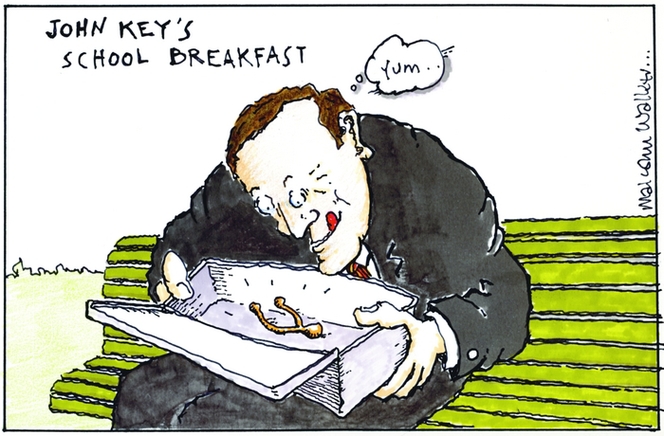.

.
Recently obtained OIA figures from the Ministry of Social Development reveal that 836 schools currently participate in the Kickstart food-in-schools programme. The programme began in 2009, between Fonterra and Sanitarium, to address a growing child poverty crisis.
According to MSD’s data, over 100,000 breakfasts are served to 27,061 children on a weekly basis.
This is in stark contrast to John Key’s claims on 5 November 2014, that hungry children in schools was only a minor problem;
“I do not believe that the number of children who go to decile 1 to 4 schools who do not have lunch is 15 percent. I have asked extensively at the decile 1, 2, 3, and 4 schools I have been to. Quite a number of principals actually even reject the notion that they need breakfast in schools. Those who do take breakfasts in schools tell me that for the odd child who does not have lunch, they either give them some more breakfast or provide them with lunch. But what they have said to me is that the number of children in those schools who actually require lunch is the odd one or two.”
“The odd one or two” is contradicted by the ministry’s own figures which states that from 13 December 2013, “more than 5.9 million breakfasts have been served since expansion“.
This would tally from Key’s own admission, on 18 October 2011, that poverty in New Zealand was continuing to worsen under his administration;
Mr Key made the concession yesterday when asked about progress with the underclass, saying it depended what measures were used but recessions tended to disproportionately affect low income earners and young people.
He said he had visited a number of budgeting services and food banks “and I think it’s fair to say they’ve seen an increase in people accessing their services. So that situation is there.”
National expanded the Kickstart programme in May 2013, in response to growing public disquiet and clamour to address the spectacle of children turning up hungry in our schools. It was also in response to Hone Harawira’s Education (Breakfast and Lunch Programmes in Schools) Amendment Bill (aka, “Feed the Kids” Bill), which had been included six months earlier in the private member’s ballot system.
As Harawira explained in May 2014,
.

“All I want to do with this Bill is make sure our kids get fed while this is being done.”
.
National’s subsequent, watered down programme to feed hungry children was derided by then-Labour leader, David Shearer;
“National’s been dragged kicking and screaming to the finish line on this. It’s only through public pressure and the pressure of Opposition parties like the Labour Party that’s got them there. But overall, it’s good for those kids who go to school hungry.”
In June 2013, then Social Development Minister, Paula Bennett, assured Radio NZ that only another hundred schools would take up the expanded Kickstart programme.
By the beginning of 2014, the programme was expanded to include all decile 1 to 10 primary, intermediate, and secondary schools.
However, MSD’s Deputy Chief Executive, Murray Edridge, revealed that there had been a “47 per cent increase since the expansion of the programme” in 2013;
“82 per cent of all participating schools are now providing KickStart breakfasts for more than two days per week and 58 per cent of schools are serving breakfasts for all five days of the week.”
This is at variance with Key’s assertions – made as late as 19 March last year – that hungry children going to school was not a problem. In minimising the problem, Key said;
“These are the facts,” Mr Key said. “At Te Waiu o Ngati Porou School, Ruatoria, Decile one, how many children came to school without lunch – answer – zero.”
At Sylvia Park School, decile two – there one or two kids, and at Manurewa Intermediate, a decile one school with a roll of 711, perhaps 12 had gone to school with no lunch.
Yes there is an issue where some children come to school without lunch. That number of children is relatively low.”
The rise in demand for KickStart breakfasts occurred at the same time as those on welfare benefits was cut dramatically;
Social Development Minister Anne Tolley said today the 309,145 people on benefit at the end of the December 2014 quarter was 12,700 fewer than last year.
“This is the lowest December quarter since 2008 and the third consecutive quarter with such record lows,” Tolley says.
Numbers on the Jobseeker Support benefit had fallen by more than 5500 since last year and had declined consistently since 2010, even as the overall working age population increased.
Even children with disabilities did not escaped this government’s culling of welfare recipients;
More than 11,000 disabled children have lost access to a welfare benefit that is supposed to support them, as officials try to rein in previously-ballooning costs.
A Child Poverty Action Group report on disabled children, launched in Auckland today, said children supported by the child disability allowance almost trebled from 17,600 in 1998 to 45,800 in 2009, but were then cut back to just 34,500 last June.
The cut has been achieved both by tightening criteria and by simply not publicising the allowance.
The problem of hungry school children drew John Key’s attention as far back as 2007, when he was still Leader of the Opposition;
National launches its Food in Schools programme
Sunday, 4 February 2007, 1:21 pm
Press Release: New Zealand GovernmentJohn Key MP
National Party Leader3 February 2007
National launches its Food in Schools programme
National Party Leader John Key has announced the first initiative in what will be a National Food in Schools programme.
“National is committed to providing practical solutions to the problems which Helen Clark says don’t exist,” says Mr Key.
During his State of the Nation speech on Tuesday, Mr Key indicated National would seek to introduce a food in schools programme at our poorest schools in partnership with the business community.
Mr Key has since received an approach from Auckland-based company Tasti foods.
“I approached Wesley Primary School yesterday, a decile 1 school near McGehan Close, a street that has had more than its fair share of problems in recent times. I am told Wesley Primary, like so many schools in New Zealand, has too many kids turning up hungry.
“We’re putting Tasti and Wesley Primary together. This is a fantastic first step. In addition to this, Tasti has indicated they may wish to expand their generous donation of food to other schools in need, and we’ll be looking to facilitate that.
“We all instinctively know that hungry kids aren’t happy and healthy kids.”
Mr Key is also inviting other businesses to contact National so it can work on expanding the programme.
“I want this to be the first of many schools and businesses that we put together. I’m interested in what works and I am humbled by the support this idea has received already. We are going to put together the package while in Opposition. We are not waiting to be in Government, because all our kids deserve better.”
According to National, this was a critical problem in 2007.
Yet, on 19 March, National and it’s coalition supporters voted down Mana’s “Feed the Kids” Bill (which had been taken over by the Green Party after Hone Harawira lost his Te Tai Tokerau seat in 2014). The Bill was defeated 61 to 59, courtesy of National, ACT, and Peter Dunne.
MSD also disclosed that 26 applications for participation in the KickStart programme had been declined. This included Early Childhood Education (ECE) providers. No reason was given despite the OIA request specifically asking the basis for which applications were declined.
This indicates that pre-schoolers are presently attending ECE facilities and going hungry.
The MSD also admitted that Charter Schools – which are funded at a higher rate than State and Integrated Schools – also participate in the KickStart programme. Their information did not reveal how many or which Charter Schools were participating. The MSD statement confirmed that “the provision of the [KickStart] programme does not affect a school’s funding“.
Kidscan currently lists fourteen schools that are still awaiting “urgent support, that’s 1,661 children waiting for food, clothing and basic healthcare“.
In contrast, several European nations provide free meals to school children;
The school lunch provides an important opportunity for learning healthy habits, and well-balanced school meals have been linked to improved concentration in class, better educational outcomes and fewer sick days. Given the importance of these meals, what is being done across Europe to ensure all children have a balanced and enjoyable lunch?
Many countries in Europe have policies to help schools provide nutritionally balanced meals which also reflect the general eating culture of each nation. Often, lunch is eaten in a cafeteria-like setting where children receive food from a central service point (e.g. Finland, Sweden and Italy).
In Finland and Sweden, where all school meals are fully funded by the government, lunches follow national dietary guidelines including the ‘plate model’. An example meal is presented to guide children’s self-service…
Finland – which consistently scores highly in OECD PISA educational rankings – introduced free school meals in 1948;
Finland was the first country in the world to serve free school meals. 1948 is seen as being the year when free school catering really started, though catering activities on a smaller scale had been around since the beginning of the 20th century.
[…]
Section 31 of the Basic Education Act states that pupils attending school must be provided with a properly organised and supervised, balanced meal free of charge every school day.
[…]
The role of school meals is to be a pedagogical tool to teach good nutrition and eating habits as well as to increase consumption of vegetables, fruits and berries, full corn bread and skimmed or low fat milk.
Interestingly, the Finns describe free school meals as an Investment in Learning;
In Finland, we are proud of our long history of providing free school meals…
… A good school meal is an investment in the future.
With rising housing and rental costs, and wage increases at or below inflation, not every family can successfully balance budgets to ensure a nutritious meal for their children. When it comes to a decision whether to pay the power bill, or cut back on groceries for the week – it is often the latter that is sacrificed.
The Salvation Army recently outlined the problem of the phenomenon known as the “working poor“;
Every week 314 new people contact the Salvation Army for assistance, and those who are currently working are often at risk too.
[…]The Salvation Army says it is meeting more and more responsible people who have experienced misfortune that has derailed their lives.
It believes the cost of rent is a dangerous factor, even for those working.
“It doesn’t leave a lot of room for something to go wrong,” says Jason Dilger, a representative for the Salvation Army. “I do believe there are a significant number of people out there who are vulnerable.”
It says an increasing number of Kiwis are living pay-by-pay, but ideally everyone would have a financial safety net set aside to help with any unexpected hiccups.
“So many people aren’t even in a position to think that way because they’re just trying to meet expenses week to week.”
In a 2014 report, the Salvation Army stated;
Given the recent growth in the number of jobs available and the gradual decline in levels of unemployment, we should have seen a tapering off in demand for food parcels from food banks. We have not seen this. Such demand has remained virtually unchanged since 2010, which suggests that many households are still struggling to pay bills and feed their family despite the economy recovery. Overall living costs of low income households appear to be moving in line with general inflation.
Which illustrates that the problems faced by poor, lowly-paid, and beneficiary families is not choices in expenditure – but low incomes which fail to meet the many day-to-day, week-to-week, demands placed on them.
From the 1950s through to the 1970s, a single income was often sufficient to raise a family and pay the bills.
In contemporary New Zealand, this is no longer the case. Falling rates of home-ownership is just one indicator that incomes are not keeping pace with rising costs of living.
Growing child poverty is another symptom of the increase in inequality since the mid-1980s. Prior to the 1980s, food banks were practically an unknown rarity;
“Nationally, the number of foodbanks exploded following the 1991 benefit cuts, and the passage of the Employment Contracts Act (ECA). For those in already low-paid and casual jobs, the ECA resulted in even lower wages (McLaughlin, 1998), a situation exacerbated by the high unemployment of the early 1990s (11% in 1991). The benefit cuts left many with debts, and little money to buy food (Downtown Community Ministry, 1999). In 1992 the introduction of market rents for state houses dealt another blow to state tenants on low incomes. By 1994 it was estimated that there were about 365 foodbanks nationally, one-fifth of which had been set up in the previous year (Downtown Community Ministry, 1999).” – “Hard to swallow – Foodbank Usage in NZ”, Child Poverty Action Group, 2005
Shifting responsibility for this ever-growing problem onto victims of inequality and poverty is a form of denial. It is little more an attempt to evade the problem, especially when no practical solutions (other than class-based eugenics) are offered.
Addressing the real causes of poverty and working-poor will be a tough call. Ensuring that all children are provided nutritious meals at school is the first step down this road.
As John Key said nine years ago;
“We all instinctively know that hungry kids aren’t happy and healthy kids.
… all our kids deserve better.”
Indeed, John. I couldn’t have said it better.
Postscript
The MSD response to my OIA request also confirmed that the increased up-take of the KickStart programme was not restricted solely to low-decile schools;
Since the expansion [in 2013] 170 schools rated decile five or higher have joined the programme.
Which indicates that schools in middle-class areas are now requiring State assistance to feed hungry children.
.
.
.
References
Email: OIA Response from Ministry of Social Development
Kickstart Programme: Home
NZ Herald: Key admits underclass still growing
NZ Herald: 300,000+ Kiwi kids now in relative poverty
Parliament Today: Questions and Answers – November 5
Scoop media: Hone Harawira – Feed the Kids Bill
NZ Herald: Harawira’s ‘feed the kids’ bill begins first reading
Radio NZ: Govt gives $9.5m to expand food in schools programme
Radio NZ: Government to expand food in schools programme (audio)
Kickstart Programme: FAQ
NZ Herald: Government votes down ‘feed the kids’ bill
Radio NZ: Parliament rejects free school lunch bills
Fairfax media: Beneficiary numbers fall again: Government
NZ Herald: 11,000 disabled children lose welfare benefit
Scoop media: National launches its Food in Schools programme
Radio NZ: Ministry says charter schools “over-funding” is $888,000
Kidscan: Supporting Schools
European Food Information Council: School lunch standards in Europe
Wikipedia: Programme for International Student Assessment (PISA) – 2012
Finnish National Board of Education: School Meals in Finland – Investment in Learning
TV3 News: Salvation Army reaches out to working poor
Salvation Army: Striking a Better Balance
NZ Federation of Family Budgetting: Why are so many of us struggling financially?
Child Poverty Action Group: Hard to swallow: Foodbank use in New Zealand
Additional
Fightback: Feed the Kids, end the hunger system
NZ Herald: Number of Kiwi kids in poverty jumps by 60,000
Previous related blogposts
Can we afford to have “a chat on food in schools”?
National dragged kicking and screaming to the breakfast table
Are we being milked? asks Minister
High milk prices? Well, now we know why
Poor people – let them eat cake; grow veges; not breed; and other parroted right wing cliches
.
.
.

.
.
= fs =






In the countries you mentioned, *all* children receive a free/subsidised meal at school and this is the secret of the success of these programmes. There is no stigma. Because the middle class is using these programmes, no politician would dare to cancel them because the middle class is very good at protecting their entitlements and voting. If you have a programme that is for the poor only, you have stigma, a lack of support from wider society and a lack of a well-organised interest group that is able to protect the programme and to demand high quality.
What a shame websites don’t employ journalists (yet). Frank’s well-researched and well-argued piece makes professional newspaper columnists like Rosemary McCleod look like the screeching weasels they are. Thanks Frank, keep up the good work.
Rosemary hasn’t been a journalist for years.
Frank is a Kiwi treasure for sure and definite!
That he is, Mick, that he is. His blogposts are the first I look out for on TDB.
I too go straight to Frank’s new posts, once I see them, among the others. He has a skill of digging where he is bound to find something, that the government does not want us to find. I know someone like that, but apart from that, and from Frank, there are few people gifted with research and analytical skills. Thanks again, Frank.
I see a failure of logic here:
Just because breakfasts are provided doesn’t mean
a) They need it
b) The parents are financially incapable of providing it themselves
Your politicisation and oversimplification of this issue is pathetic.
Well, Andrew, I was anticipating the first of many poverty-deniers to attempt to ridicule or dismiss the points I’ve raised. I’m reassured that my understanding of the prejudiced side of human nature is still fairly spot on.
Not only have you failed to address any of the facts I’ve presented – but your assertions that “Just because breakfasts are provided doesn’t mean a) They need it b) The parents are financially incapable of providing it themselves” is not supported by facts from yourself.
In effect, you’re dismissing the evidence provided in favour of your deepest, most cherished prejudice.
Your term “pathetic” is indeed apropos.
So, Andrew, what evidence do you have that children aren’t needing breakfasts? Please, share your enlightenment with us.
You’re in denial, Andrew. You and all your National and Act mates.
This from Boingboing. Chilling stuff.
Starving the poor to feed the rich.
http://boingboing.net/2016/02/28/500000-to-1m-unemployed-ameri.html
We get propaganda galore from the government, with endless spin on figures, like supposed drops in numbers of people receiving benefits. But with the welfare reforms, about which they have so far boasted themselves, there has at the coal face been a slash and burn approach, and you will only find this out by studying, analysing and assessing the figures as Frank has here done again.
On the one hand the Nats say they “increase” benefits (by a meagre $ 25 gross), but that is only for those with children, but the criteria to get any benefit has been tightened beyond anything reasonable, so they deny the benefits to as many people as possible. That is why more people were forced off benefits, even sick and disabled, to try and find any work they could. They were expected to try and cope with it, no matter what, and if they could not, they will have ended up as penniless couch-surfers at places of their relatives or friends, or under the bridge.
The slash and burn leads to more poverty, that does not get caught by many statistics anymore, as they now even manipulate figures by changing the criteria for those to be gathered.
So I am not one bit surprised about all this, it is sadly something the average middle class worker and many others are not aware of, as they are not affected. They were happy with Key’s tax cuts (benefiting the rich more than others, disadvantaging the poor) and too many could not care less about the ones at the bottom, as they are focused only on number one, and stuff the rest. This is the so-called “brighter future” we have now.
And when you ask for official information, MSD and others still dare stuff you around, and give you only bits, that one can often not do all that much with. They force us to then try the Ombudsman, who is underfunded and overworked, and has a habit of dismissing complaints by saying, they need no investigation, as the complaint may be out of scope or out of their jurisdiction.
Here is stuff showing more of what goes on:
https://nzsocialjusticeblog2013.wordpress.com/2015/11/27/msds-selective-and-poor-responses-to-new-oia-requests-on-benefits-advisors-reports-mental-health-and-sole-parent-employment-services/
PDF Version:
https://nzsocialjusticeblog2013.files.wordpress.com/2015/12/msds-selective-poor-responses-to-new-oia-requests-post-nzsjb-27-11-15.pdf
https://nzsocialjusticeblog2013.wordpress.com/2015/04/10/mental-health-and-sole-parent-employment-services-msd-withholds-o-i-a-information-that-may-prove-their-trials-a-failure/
https://nzsocialjusticeblog2013.files.wordpress.com/2015/04/mhes-spes-msd-withholds-o-i-a-info-that-may-prove-trials-a-failure-post-nzsjb-final-14-04-2015.pdf
https://nzsocialjusticeblog2013.wordpress.com/2015/08/09/msd-and-dr-david-bratt-present-misleading-evidence-claiming-worklessness-causes-poor-health/
https://nzsocialjusticeblog2013.files.wordpress.com/2015/09/msd-dr-bratt-present-misleading-evidence-on-worklessness-and-health-post-09-08-15.pdf
It appears a massive dis-entitlement agenda has been started, while on the “media front” (Propaganda Front) we get inundated with all the “good” news about unemployment being so low, when also those figures do not stack up.
The Ministry of Truth “objects” to this interpretation of statistical figures, I hear the Prime Minister shout, the Ministry of Truth will take measures, to ensure ONLY its truth will prevail. Watch your backs, dear friends, day and night, wherever you are!
Great article Frank thank you.
Lets copy more enlightened countries and feed the all kids adequate nutritious meals, recognizing that parents are often time poor as well as financially challenged. At the same time, to make sure kids are fed at other times too, lets fix Working for Families. The worst of kids do not get the weekly, soon to be, $72.50 per family of poverty alleviation tax funded tax credits:
http://www.cpag.org.nz/campaigns/the-latest-fix-working-for-families-fwff/
The well-orchestrated John Key mouthpieces will already be working on their usual replies: it is all due to poor parenting-cum-freeloading-cum-wasting money on smokes and booze, etc.
Well this shows that the problem is a hell of a lot worse than a lot of us even imagined, or would have thought possible in a country that is supposed to be one of the best places to bring up children.
New Zealand was not always like this, but Gosman and Steve’s mate John the Donkey is the leader of a government that has made it so.
National doesn’t acknowledge there is a problem, so it doesn’t have to look for a solution.
We have a non-government here. We deserve better.
You mean you can’t taper a Ponzi schem?
Who would have thought
What a tragedy for the children of the poor and SHAME when the New Zealand Labour Party decided to shaft the Mana/Int Party
( by standing Kelvin Davis in the TTT seat to defeat Hone Harawira… instead of giving Davis a safe list seat in the NZ Labour Party …thereby allowing Mana/Int into parliament and winning the Election for the Left coalition and children of the poor)
….and Lusk by accounts was also involved in the unseating of Hone Harawira
http://www.radionz.co.nz/national/programmes/mediawatch/audio/201779410/dirty-politics-players-back-in-the-frame
Yet, on 19 March, National and it’s coalition supporters voted down Mana’s “Feed the Kids” Bill (which had been taken over by the Green Party after Hone Harawira lost his Te Tai Tokerau seat in 2014). The Bill was defeated 61 to 59, courtesy of National, ACT, and Peter Dunne. – See more at: https://thedailyblog.co.nz/2016/02/29/must-read-nationals-food-in-schools-programme-reveals-depth-of-child-poverty-in-new-zealand/?utm_content=bufferbce22&utm_medium=social&utm_source=twitter.com&utm_campaign=buffer#sthash.ItkifkhI.dpuf
The coalition of the heartless – National, ACT and Peter Dunne. At least the Maori Party had a bit of heart then.
This is why these kids don’t get breakfast: Scummy, drop-kick parents:
http://www.stuff.co.nz/waikato-times/77422960/gang-members-on-benefits-children-abused
Nine out of ten gang members are on a benefit
“A total of 3516 children of gang members were recorded as victims of abuse or neglect that had been substantiated on investigation by Child, Youth and Family.”
“Forty-four per cent were emotionally abused, 28 per cent were neglected, 13 per cent were physically abused and 4 per cent were sexually abused in terms of substantiated findings.”
“The alleged perpetrator of abuse or neglect of gang members’ children was more often recorded as the child’s mother than the gang member father. However, caution should be taken with this finding, as the relationship was not recorded for 20 per cent of cases”
“It is estimated lifetime-to-date total cost to Child, Youth and Family from the adult gang members and their children was at least $189 million”
“We estimate that the direct and indirect costs to Child, Youth and Family of the 5890 known children of gang members was in the vicinity of $131m,” the report states.”
“We estimate the direct and indirect costs … was in the vicinity of $58m. This is likely to be an underestimate due to data limitations. Estimated costs cover both the care and protection and Youth Justice areas”
These are all quotes from the latest MSD report on gangs.
And what is your stand re corporate welfare? And what would you do with the kids that live in gang households, take them away and lock them into separate lock ups or kiddy camps, paid for by the taxpayer? There are no easy solutions to this, but I suspect you have your own ruthless “solutions”, we rather not wish to even think of.
Well, Andrew, all I can say is that (a) you are grasping at straws becauise (b) you haven’t read the information from MSD, that I presented.
MSD’s own figures state that “… over 100,000 breakfasts are served to 27,061 children on a weekly basis”
That’s 23,545 children not covered by your gangs-related finger-pointed. And of the “3516 children of gang members”, you don’t actually tell us how many participate in National’s Food in Schools programme.
You’re assuming the number is 3,516. Which is still a far cry from 27,061.
Next point; even if every single child of that 27,061 was from a gang-family – so what?
Are you blaming children for being born in gangs?
If so, do you also blame children who are sexually abused by non-gang families?
If seems that you are willing to blame the victims for their circumstances, and in do so, thoroughly unwilling to do anything about it.
In effect, what you inferring is, “you had the misfortune to be born into a gang family – tough luck”.
No, Andrew, your victim blaming does not wash. It is a pathetic attempt to absolve yourself of any responsibility to be part of a constructive solution. Letting children starve is not a solution, it is some weird, quasi-moralistic judgementalism that serves your need to be guilt-free.
Don’t forget that the Food in Schools programme was implemented by two corporations and then expanded by this government. It is not a left-wing initiative.
Which means that even your right-wing pals understand the magnitude of this social crisis, even as you work hard to try to rationalise to ignore it.
Newsflash, ignoring a problem or blaming the victims doesn’t make things better.
Frank:
…and you have failed to demonstrate that those receiving free breakfasts have parents who truly cannot afford to fed them, as opposed to parents who just couldn’t be bothered to feed them.
Why wast your time with such philosophical questions?
The phrase was: raise the tide, you raise all boats.
Not: raise the tide in lake Taupo.
[…] blogpost was first published on The Daily Blog on 29 February […]
Comments are closed.